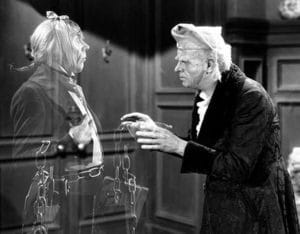Guest Blogger and long-time Council friend, Bob W. presents Part 44 of a series dealing with Alcoholism and Addiction from a Mystical, Mythological Perspective, reflecting Bob’s scholarly work as a Ph.D. in mythological studies.
In the Charles Dickens’ story, A Christmas Carol, the protagonist, Ebenezer Scrooge, a miserly banker whom no one likes and who has nothing good to say about life, sees an apparition late on Christmas Eve. It is of his long dead partner, Jacob Marley, who warns him of the errors of his miserly ways and foretells the coming of three spirits in dreams Scrooge is to have that same night.
In the first such dream, the Ghost of Christmas Past takes Scrooge to the place of his boyhood and has him witness an adolescent Ebenezer struggling with his long abandonment by his father to a difficult boarding school. The young Ebenezer is rescued and brought home by his dear sister, but, as he grows into manhood in the dream, he becomes obsessed with the idea of working tirelessly to be financially successful, perhaps as a counterweight to the feelings of loneliness and deprivation he had as a boy.
The Ghost takes Scrooge through the various times of his later life…early adulthood, middle age, and full maturity, observing his increasing focus on financial success and on a gradual withdrawal from society.
The second dream has the Ghost of Christmas Present taking Scrooge around to those people of Scrooge’s current life, showing their happiness with simple things despite a very meager set of living circumstances.
The third dream, with the Ghost of Christmas Yet to Come, focuses on a series of dire future happenings that seem fully ordained, but for which Scrooge becomes obsessed with a desire to change.
Upon waking up on Christmas morning, Scrooge is entirely transformed. He immediately attends to the serious circumstances of those people in his current life and commits himself to living a happy, joyous life with all those around him.
It occurs to me that, while the circumstances and nature of Scrooge’s addiction is radically different, the process of his deterioration over time and the depth of the societal chasm he creates for himself provide a stark parallel to our lives in the diseases of alcoholism and drug abuse. Looking at the process of his change over Christmas Eve into Day, there appears a wonderful, if highly compressed, parallel to our getting sober and working the steps.
The confrontation with Marley is the beginning of the great awakening. The journeys on which he is taken by the three Spirits seem akin to the working of Steps, traversing the long-gone and recent pasts to get a sense of the depth of his disease, and then the embrace of a new way to be present in the world. They all seem a very sharp and poignant parallel to our own journeys.
The people Scrooge attends to on Christmas Day and beyond – his housekeeper, his clerk and family, and his own nephew, the son of his dear sister – all convey to Scrooge an infectious joy and wonder at life, one that seems to echo our own joyous lives in sobriety today.

